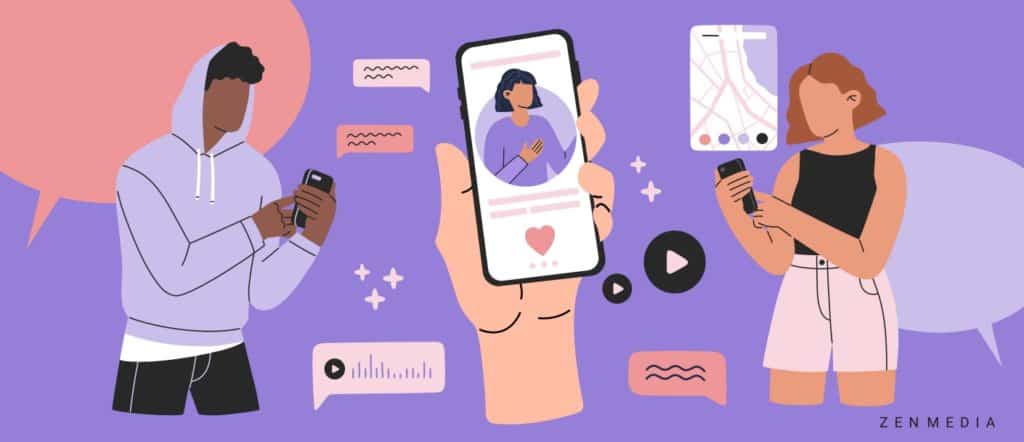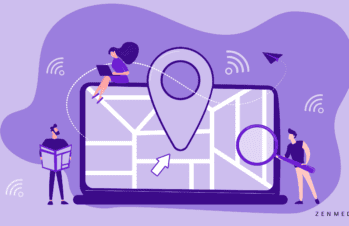We all know that TikTok is the next big thing in B2B social media marketing—especially for those that prefer video content (which is most people, according to Forrester)—but many don’t realize how significantly TikTok has changed the way we absorb and process information.
It surpassed two billion mobile downloads in October 2020 and became the third fastest growing brand that year after Zoom and Peacock. While some predicted that TikTok’s popularity wouldn’t last, it’s proven that it has real staying power, and soon after its rise in popularity, other social media platforms (like Instagram) took notice and began adapting to TikTok’s model (cue: Reels).
TikTok takes trends to a whole new level. Unlike other social media platforms, it capitalizes on popular sounds that different users can engage with and create content around. And many prefer its more organic, filter-free feel.
Related reading: 5 Tips to Hacking the Tiktok Algorithm
While users can participate in massive global trends, they also know that they’re getting extremely personalized content on their For You page (FYP).
Many theorize that the social media platform is so beloved by Gen Z because of its organic nature, lack of paid advertising and promotional materials, and because it relies less heavily on hashtags and many of the other tricks of the trade social media marketers and influencers alike have depended upon for other platforms.
Why Social Media is Replacing Google and What It Means for Marketing
The way we engage with information in the digital age is changing. TikTok, and to a lesser degree, Instagram, are replacing traditional search engines. In fact, according to Google, 40% of young people prefer finding information on TikTok and Instagram over Google.
So what does this mean for marketers?
Your social media presence is vital, and user-generated content (UGC) will be key in influencing buyer decisions. Social media searchers are likely looking for UGC—not your company website—to learn about your product, service, or brand.
Related reading: Why Your B2B Marketing Strategy Needs Sales Collateral
B2Bs might think, “My decision-makers aren’t Gen Z, so this doesn’t apply to me,” but they couldn’t be more wrong. Just like older generations followed Gen X and Millennials in adopting Facebook, companies must expect that all generations will gradually move to more video-first, trend-focused, niche communities that TikTok and Reels serve.
As TikTok continues to dominate the social media marketplace, its influence does as well.
A lot of this comes down to the fact that Gen Z often looks to their peers (people generally in their same age group) for information.
They’re not turning to a Zagat guidebook to pick out the latest restaurant. They’re searching within social media apps to see where other people are eating. Similarly, when world events or breaking news comes to our inboxes, Gen Z is scouring for information and opinions on TikTok and Reddit to give them context. They’re always on the hunt for engaging, immersive, and shareable content.
Many traditional marketing and PR agencies still struggle to take social content seriously as a viable marketing tool. While Instagram reels and viral TikTok trends might seem like fun and games, they’re set to define the future of marketing and (quite unexpectedly) take out giants like Google—a platform common enough to become a verb (“What have you Googled lately?”)
But Gen Z isn’t looking to invest in tradition. They’re invested in their peers and the community around them—and that’s where they go for advice, information, and more. That’s why community and network marketing through social apps will become a more viable, if not necessary, form of marketing for businesses across industries.
Related Reading: The Ultimate Guide to Community Management for Marketers
Social Media and Misinformation
Of course, the issue with a lot of content on social media is that it is based on opinion rather than fact.
We saw lots of misinformation spread on Facebook and Instagram during the pandemic—so much so that Instagram installed misinformation labels and began fact-checking posts.
People aren’t just using social media apps to find the latest restaurant or coffee shop—it’s where they’re learning about local and global events, politics, religion, and more. And there’s a significant opportunity for these opinions to be formed on conjecture.
While Google is working on indexing popular TikToks and Reels, leaders need to understand that social media isn’t just fun and games. It’s a tool that helps shape opinions and beliefs—and this is true when it comes to brands as well. If you don’t have a significant presence on one of the key social media apps, you’re significantly reducing your share of voice and potentially harming the future of your company.
Related reading: How PR Campaigns Can Change Negative Public Perceptions
It’s more important than ever to cultivate a strategic presence on social media, to begin gathering sales collateral and UGC from your users, and to help combat potential misinformation about your brand or leaders.
How Social Video Influences Purchasing Decisions
If social apps are being used to educate users on a wide variety of topics, they will absolutely be used to help users make purchasing decisions. In fact, they already are. 95% of buyers say watching videos greatly influences their purchase decisions, indicating that they are more likely to buy a product after watching a video.
So far, Instagram still reigns supreme when it comes to purchasing power, with 38% of Gen Z shoppers surveyed saying it was their preferred platform for making in-app purchases. This could partly be due to Instagram’s built-in shop feature, which makes it easier for users to purchase products within the app. TikTok was tied with Facebook in second place for in-app purchases at 22%. This same survey indicated that 75% of Gen Z are influenced by where their social circle shops—and this is true in terms of the brands they buy from and the platforms they complete purchases on.
A simple video of an influencer (think Emma Chamberlain) noting a brand they use or sitting in a local coffee shop has the potential to boost serious sales for major brands and small businesses alike.
Understanding how Gen Z thinks (and shops) will be imperative for businesses that want a long-term impact. Social media is the new search engine, and younger generations are set to transform the way companies sell their products and services.




